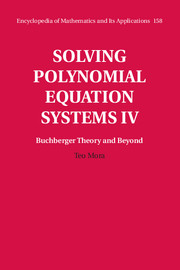52 - Sweedler
from PART SEVEN - Beyond
Published online by Cambridge University Press: 05 April 2016
Summary
A Technical Report dated August 1985 of Cornell University contained not only a very good and elementary introduction to Buchberger theory but set a research manifesto with sentences like the following.
Gröbner bases are remarkable generating sets for ideals in polynomial rings. […] The Gröbner basis allows one to answer questions of algebraic interest, such as whether an element of the ring lies in the ideal. Gröbner bases allow one to find generators for the intersection of ideals and have many other applications. The theory and techniques which have grown up about Gröbner bases are an important branch of computer algebra. Many of the techniques associated with Gröbner bases are simple enough to be taught in undergraduate algebra classes. Outside of algebra, Gröbner bases have applications to robotics, computational geometry and geometric theorem proving. Applications to surface modeling and cryptography are under investigation.
[…]
Buchberger theory is an appropriate name for the area. In the same way Galois theory refers to a body of techniques. PROPAGANDA: Buchberger theory is as fundamental and more elementary then Galois theory and should be taught in advanced undergraduate algebra courses and the first year graduate algebra course.
[…]
The four cornerstones of Buchberger theory are:
LEADING TERMS REDUCTION
BASIS TEST BASIS CONSTRUCTION
[…]
WHERE THE ACTION ISN'T North American academic mathematics departments departments! As a whole, North American algebraists, in academic mathematics departments, appear to have computer anxiety. Conferences and bibliographies, which pertain to computational and computer algebra, have a remarkable low fraction of contributors from North American academic mathematics departments. In their place one finds algebraists: from Europe, from industry and from computer science departments. North American algebraists, in academic mathematics departments, are appallingly ignorant of even the most elementary, yet relevant, developments in computational algebra.
At the same time, in two papers, the author of this pamphlet was turning his investigation to the direction set by his Manifesto:
• the construction of the Gröbner basis is naturally extended to valuation rings leading to a notion of GGB (generalized Gröbner basis);
• and to subalgebras leading to the autoreferential notion of subalgebra analog to Gröbner bases for ideals (SAGBI).
- Type
- Chapter
- Information
- Solving Polynomial Equation Systems IV , pp. 468 - 564Publisher: Cambridge University PressPrint publication year: 2016



